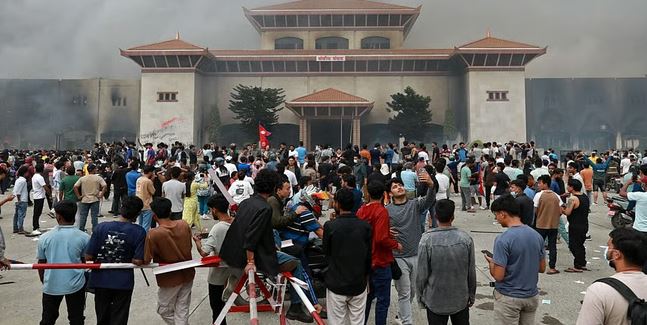News Flash

KATHMANDU, Sept 9, 2025 (BSS/AFP) - Nepali youth protesters set parliament ablaze on Tuesday as the veteran prime minister obeyed furious crowds to quit, after one of the deadliest crackdowns in years in which at least 19 people were killed.
Protesters flooded the streets of Kathmandu, some jubilant and celebrating, others setting fire to government buildings and brandishing automatic rifles.
The rapid descent into chaos shocked many, and Nepal's military warned against "activities that could lead the country into unrest and instability" in the Himalayan nation of 30 million people.
Protests began on Monday with demands that the government lift a ban on social media and tackle corruption, with police trying to crush the rallies -- including using live ammunition, according to Amnesty International.
On Tuesday, despite the government rolling back its order and the apps returning online, protests reignited, spreading from the capital to multiple cities nationwide.
"The Nepal government has fallen, the youth have won the protest," said key protest figure Sudan Gurung, in a post on newly-restored Instagram. "The future is ours."
- President calls for 'restraint' –
Gangs on Tuesday attacked and set fire to KP Sharma Oli's house, the 73-year-old, four-time prime minister and leader of the Communist Party. His whereabouts are not known.
Plumes of smoke also covered Nepal's parliament as demonstrators breached the fence and "torched the main building," Ekram Giri, spokesman for the Parliament Secretariat, told AFP.
President Ramchandra Paudel, whose offices were also set on fire by mobs, pleaded for calm.
"I appeal to all parties to exercise restraint, to not allow further damage," Paudel said in a statement.
It did not seem to be heeded.
Protesters, mostly young men, were seen waving the country's national flag as they dodged water cannons.
The International Crisis Group called it a "major inflection point in the country's uneasy experience with democratic rule".
Kathmandu's airport remains open, but some flights were cancelled after smoke from fires affected visibility, airport spokesman Rinji Sherpa said.
- 'Gen Z movement' –
Oli in his resignation letter said that he had stepped down to allow "steps towards a political solution".
His political career stretched nearly six decades, a period that saw a decade-long civil war, with Nepal abolishing its absolute monarchy in 2008 to become a republic.
First elected as prime minister in 2015, he was re-elected in 2018, reappointed briefly in 2021, and then took power in 2024 after his Communist Party forged a coalition government with the centre-left Nepali Congress in the often-volatile parliament.
What happens next is unclear.
"In the context of a revolution, constitutional or legal provisions do not apply right now," constitutional lawyer Dipendra Jha told AFP, saying that the "normal" process would have been for the president to call on the next leader in parliament to gather a majority.
"The protesters, leaders who are trusted by them and the army should come together to pave the way for a caretaker government," Jha added.
Crisis Group analyst Ashish Pradhan echoed that, saying a "transitional arrangement will now need to be charted out swiftly and include figures who still retain credibility with Nepalis, especially the country's youth".
Balendra Shah, the 35-year-old engineer-turned-rapper who was elected as Kathmandu's mayor in 2022, and who is seen as a popular figure in the transition ahead, used Facebook to call on people to "be restrained".
"We had made it clear: this is purely a Gen Z movement," Shah wrote after Oli's resignation, referring to young people aged largely in their 20s.
"Your generation must take the lead in running the country. Be ready!"
People aged 15-40 make up nearly 43 percent of the population, according to government statistics -- while unemployment hovers around 10 percent and GDP per capita is just $1,447, according to the World Bank.
Several social media sites -- including Facebook, YouTube and X -- were blocked on Friday, after the government cut access to 26 unregistered platforms.
Since then, videos contrasting the struggles of ordinary Nepalis with the children of politicians flaunting luxury goods and expensive vacations have gone viral on TikTok, which was not blocked.
"This frustration has been building for over two decades, fuelled by corruption," said a 26-year-old protester, who did not want to be named.
"What you see now is just a spark ignited by social media."